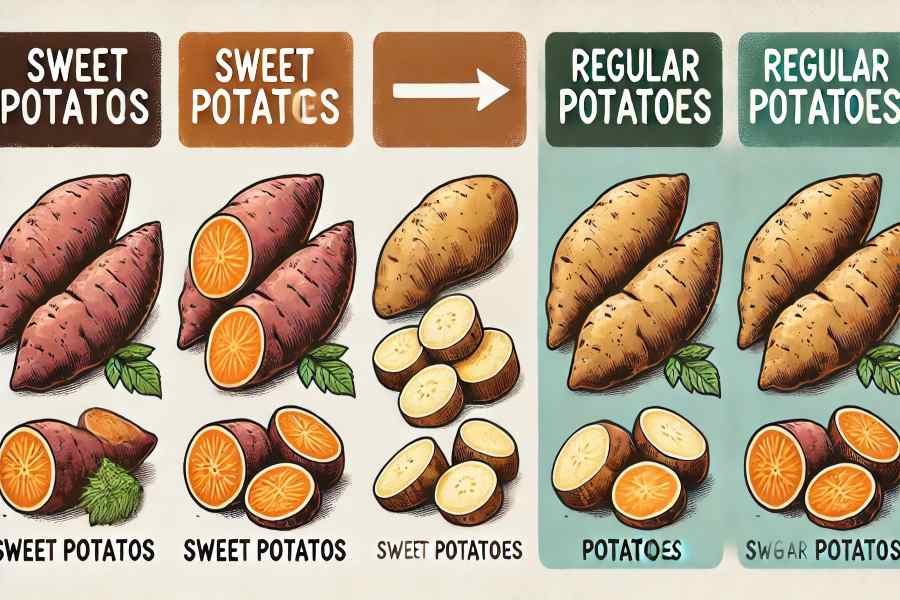Sweet potatoes and regular potatoes are both popular starchy vegetables enjoyed worldwide. Despite their similarities, they differ significantly in terms of nutritional value, health benefits, and culinary uses. Understanding these differences can help you make more informed dietary choices and optimize your meals for health and taste. In this article, we will delve into the key distinctions between sweet potatoes and regular potatoes, exploring their nutritional profiles, health impacts, and best culinary practices. Whether you are seeking to improve your diet or simply curious about these versatile vegetables, read on to discover the intriguing world of sweet potatoes vs. potatoes.
Sweet Potatoes Vs. Potatoes
When comparing sweet potatoes vs. regular potatoes, it’s important to consider their nutritional benefits and uses. Sweet potatoes are rich in beta-carotene, vitamin A, and fiber, making them excellent for boosting immunity and digestive health. Regular potatoes, while also nutritious, provide a good source of vitamin C, and potassium, and are generally lower in calories. The choice between them depends on your dietary needs and preferences, as both can be part of a healthy diet.
Nutritional Comparison Of Sweet Potatoes Vs. Potatoes
When comparing the nutritional content of sweet potatoes and regular potatoes, it’s evident that each has distinct advantages. Sweet potatoes are celebrated for their high beta-carotene content, a powerful antioxidant that the body converts into vitamin A. This vitamin is essential for maintaining healthy vision, supporting the immune system, and promoting skin health. Additionally, sweet potatoes are an excellent source of dietary fiber, which aids in digestion, helps control blood sugar levels, and keeps you feeling full longer, making them a valuable food for weight management.
Regular potatoes, on the other hand, are rich in vitamin C, an essential nutrient that plays a critical role in immune function, skin health, and wound healing. Vitamin C also acts as an antioxidant, helping to protect cells from damage. Furthermore, regular potatoes are a good source of potassium, a mineral vital for maintaining healthy blood pressure levels, proper muscle function, and overall cardiovascular health. Despite having fewer calories than sweet potatoes, regular potatoes still offer a significant nutritional punch.
In terms of carbohydrate content, both types of potatoes provide a substantial amount of energy, with sweet potatoes having slightly more carbohydrates. However, the type of carbohydrates differs between the two. Sweet potatoes have a lower glycemic index (GI) compared to regular potatoes. This means that sweet potatoes cause a slower, more gradual rise in blood sugar levels, making them a better option for individuals managing diabetes or those seeking to avoid blood sugar spikes.
Lastly, while both sweet potatoes and regular potatoes are versatile and nutrient-rich, their differences can help tailor dietary choices to specific health needs. For example, the higher fiber content and lower glycemic index of sweet potatoes may be beneficial for weight management and blood sugar control, while the vitamin C and potassium in regular potatoes support immune function and heart health. Incorporating both types of potatoes into your diet can provide a broad spectrum of nutrients, contributing to overall health and well-being.
Health Benefits Of Sweet Potatoes Vs. Potatoes
- Rich in Beta-Carotene: Sweet potatoes are high in beta-carotene, which converts to vitamin A, supporting eye health and immune function.
- High in Fiber: The fiber content in sweet potatoes aids digestion and promotes a healthy gut.
- Antioxidant Properties: Sweet potatoes contain antioxidants that help combat oxidative stress and reduce inflammation.
- Vitamin C Content: Regular potatoes provide a significant amount of vitamin C, essential for immune health and skin repair.
- Potassium-Rich: Potatoes are high in potassium, which is important for maintaining healthy blood pressure and muscle function.
- Calorie Control: Regular potatoes have fewer calories compared to sweet potatoes, making them a suitable option for those on a calorie-restricted diet.
Culinary Uses And Preparation Methods
1. Sweet Potatoes:
- Baking: Sweet potatoes can be baked to create a nutritious and delicious side dish.
- Roasting: Roasting sweet potatoes enhances their natural sweetness and creates a caramelized exterior.
- Mashed: Mashed sweet potatoes make a creamy and flavorful alternative to regular mashed potatoes.
- Frying: Sweet potato fries are a popular, healthier alternative to regular fries, offering a unique taste and texture.
2. Regular Potatoes:
- Boiling: Boiled potatoes can be used in salads or as a simple side dish.
- Mashing: Mashed potatoes are a classic comfort food that pairs well with various dishes.
- Roasting: Roasted potatoes are crispy on the outside and soft on the inside, making them a favorite side.
- Baking: Baked potatoes are versatile and can be topped with a variety of ingredients for a complete meal.
Nutritional Profiles In Detail
Sweet Potatoes:
- Calories: Sweet potatoes contain approximately 112 calories per cup.
- Carbohydrates: They have about 26 grams of carbohydrates per cup, with a low glycemic index.
- Fiber: Sweet potatoes provide around 4 grams of fiber per cup.
- Vitamins: High in vitamins A and C, with smaller amounts of B vitamins and vitamin E.
Regular Potatoes:
- Calories: Regular potatoes have about 110 calories per cup.
- Carbohydrates: They contain around 24 grams of carbohydrates per cup.
- Fiber: Regular potatoes offer about 2 grams of fiber per cup.
- Vitamins: Rich in vitamin C and potassium, with smaller amounts of vitamins B6 and folate.
Summary
When choosing between sweet potatoes and regular potatoes, consider your nutritional needs and dietary goals. Sweet potatoes are excellent for those looking to increase their intake of beta-carotene and fiber, and they offer a lower glycemic index. Regular potatoes are a great source of vitamin C and potassium and are lower in calories. Both types of potatoes can be part of a balanced diet, providing different health benefits and culinary versatility. Ultimately, incorporating a variety of both can ensure you reap the unique advantages each has to offer.
FAQs
Are Sweet Potatoes Better For Weight Loss Compared To Regular Potatoes?
Sweet potatoes have more fiber and a lower glycemic index, which can aid in weight management, but regular potatoes are lower in calories, so both can fit into a weight loss diet depending on overall calorie and nutrient intake.
Can Diabetics Eat Sweet Potatoes Instead Of Regular Potatoes?
Yes, sweet potatoes have a lower glycemic index, making them a better option for blood sugar control in diabetics.
Do Sweet Potatoes And Regular Potatoes Have The Same Amount Of Vitamins?
No, sweet potatoes are higher in vitamin A and fiber, while regular potatoes provide more vitamin C and potassium.
Which Type Of Potato Is More Versatile In Cooking?
Both sweet potatoes and regular potatoes are highly versatile, with each offering unique flavors and textures suitable for various cooking methods.
Are There Any Significant Taste Differences Between Sweet Potatoes And Regular Potatoes?
Yes, sweet potatoes have a naturally sweeter flavor, while regular potatoes have a more neutral taste, making them suitable for different types of dishes.










